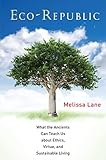Eco-Republic : What the Ancients Can Teach Us about Ethics, Virtue, and Sustainable Living / Melissa Lane.
Material type: TextPublisher: Princeton, NJ : Princeton University Press, [2011]Copyright date: ©2011Edition: Course BookDescription: 1 online resource (256 p.)Content type:
TextPublisher: Princeton, NJ : Princeton University Press, [2011]Copyright date: ©2011Edition: Course BookDescription: 1 online resource (256 p.)Content type: - 9780691151243
- 9781400838356
- BUSINESS & -- ECONOMICS -- Development -- Sustainable Development
- BUSINESS & -- ECONOMICS -- Environmental Economics
- BUSINESS and amp -- ECONOMICS -- Development -- Sustainable Development
- BUSINESS and amp -- ECONOMICS -- Environmental Economics
- Climatic changes -- Philosophy
- Climatic changes -- Political aspects
- Climatic changes -- Philosophy
- Climatic changes -- Political aspects
- PHILOSOPHY -- History & -- Surveys -- Ancient & -- Classical
- Philosophy -- History and amp -- Surveys -- Ancient and amp -- Classical
- Sustainability -- Philosophy
- Sustainability -- Political aspects
- Sustainability -- Philosophy
- Sustainability -- Political aspects
- PHILOSOPHY / Ethics & Moral Philosophy
- Adeimantus
- Advertising
- Advocacy
- Akrasia
- Allegory of the Cave
- Analogy
- Aristotelianism
- Calculation
- Callicles
- Cambridge University Press
- Capitalism
- Cardinal virtues
- Certainty
- Climate change
- Communism
- Consequentialism
- Consideration
- Convenience
- Cost–benefit analysis
- Criticism
- Crito
- Danielle Allen
- Democracy
- Deontological ethics
- Dictatorship
- Discipline
- Economics
- Environmentalist
- Ethics
- Ethos
- Friedrich Nietzsche
- George Kateb
- Glaucon
- Greenhouse gas
- Hannah Arendt
- Harm principle
- Hedonism
- Illustration
- Immanuel Kant
- Infrastructure
- Institution
- Intergovernmental Panel on Climate Change
- John Stuart Mill
- Jonathon Porritt
- Just society
- Liberal democracy
- Liberalism
- Modernity
- Morality
- Of Education
- Oligarchy
- On Liberty
- Our Common Future
- Oxford University Press
- Phenomenon
- Philip Pettit
- Philosopher
- Philosophy
- Plato
- Platonism
- Pleonexia
- Political philosophy
- Politician
- Politics
- Pricing
- Principle
- Protagoras
- Psychology
- Public policy
- Quentin Skinner
- Reflections on the Revolution in France
- Regulation
- Renewable energy
- Republic (Plato)
- Requirement
- Ring of Gyges
- Ruler
- Science
- Scientific consensus
- Scientist
- Self-control
- Self-interest
- Slavery
- Sophist
- Status quo bias
- Supply (economics)
- Sustainability
- Tax
- Technology
- The Philosopher
- Theory
- Think tank
- Thought
- Totalitarianism
- Utilitarianism
- Value (ethics)
- Virtue ethics
- Voting
- Wealth
- Writing
- 338.9/27 23
- online - DeGruyter
| Item type | Current library | Call number | URL | Status | Notes | Barcode | |
|---|---|---|---|---|---|---|---|
 eBook
eBook
|
Biblioteca "Angelicum" Pont. Univ. S.Tommaso d'Aquino Nuvola online | online - DeGruyter (Browse shelf(Opens below)) | Online access | Not for loan (Accesso limitato) | Accesso per gli utenti autorizzati / Access for authorized users | (dgr)9781400838356 |
Frontmatter -- Contents -- Acknowledgements -- Part I. INERTIA -- Prologue to Chapter 1: Plato’s Cave -- 1. Introduction: Inertia as Failure of the Political Imagination -- An Unconsciously Platonic Prologue to Chapter 2: Carbon Detox -- 2. From Greed to Glory: Ancient to Modern Ethics – and Back Again? -- Prologue to Chapter 3: Plato’s Ring of Gyges -- 3. Underpinning Inertia: The Idea of Negligibility -- Part II. IMAGINATION -- Prologue to Chapter 4: Post-Platonic Perspectives on the Republic -- 4. Meet Plato’s Republic -- Prologue to Chapter 5: Plato on Why Virtue Matters -- 5. The City and the Soul -- Prologue to Chapter 6: Plato’s Idea of the Good -- 6. The Idea of the Good -- Part III. INITIATIVE -- Prologue to Chapter 7: Revisiting Plato’s Cave -- 7. Initiative and Individuals: A (Partly) Platonic Political Project -- Notes -- Works Cited -- Index
restricted access online access with authorization star
http://purl.org/coar/access_right/c_16ec
An ecologically sustainable society cannot be achieved without citizens who possess the virtues and values that will foster it, and who believe that individual actions can indeed make a difference. Eco-Republic draws on ancient Greek thought--and Plato's Republic in particular--to put forward a new vision of citizenship that can make such a society a reality. Melissa Lane develops a model of a society whose health and sustainability depend on all its citizens recognizing a shared standard of value and shaping their personal goals and habits accordingly. Bringing together the moral and political ideas of the ancients with the latest social and psychological theory, Lane illuminates the individual's vital role in social change, and articulates new ways of understanding what is harmful and what is valuable, what is a benefit and what is a cost, and what the relationship between public and private well-being ought to be.Eco-Republic reveals why we must rethink our political imagination if we are to meet the challenges of climate change and other urgent environmental concerns. Offering a unique reflection on the ethics and politics of sustainability, the book goes beyond standard approaches to virtue ethics in philosophy and current debates about happiness in economics and psychology. Eco-Republic explains why health is a better standard than happiness for capturing the important links between individual action and social good, and diagnoses the reasons why the ancient concept of virtue has been sorely neglected yet is more relevant today than ever.
Mode of access: Internet via World Wide Web.
In English.
Description based on online resource; title from PDF title page (publisher's Web site, viewed 03. Jan 2023)


